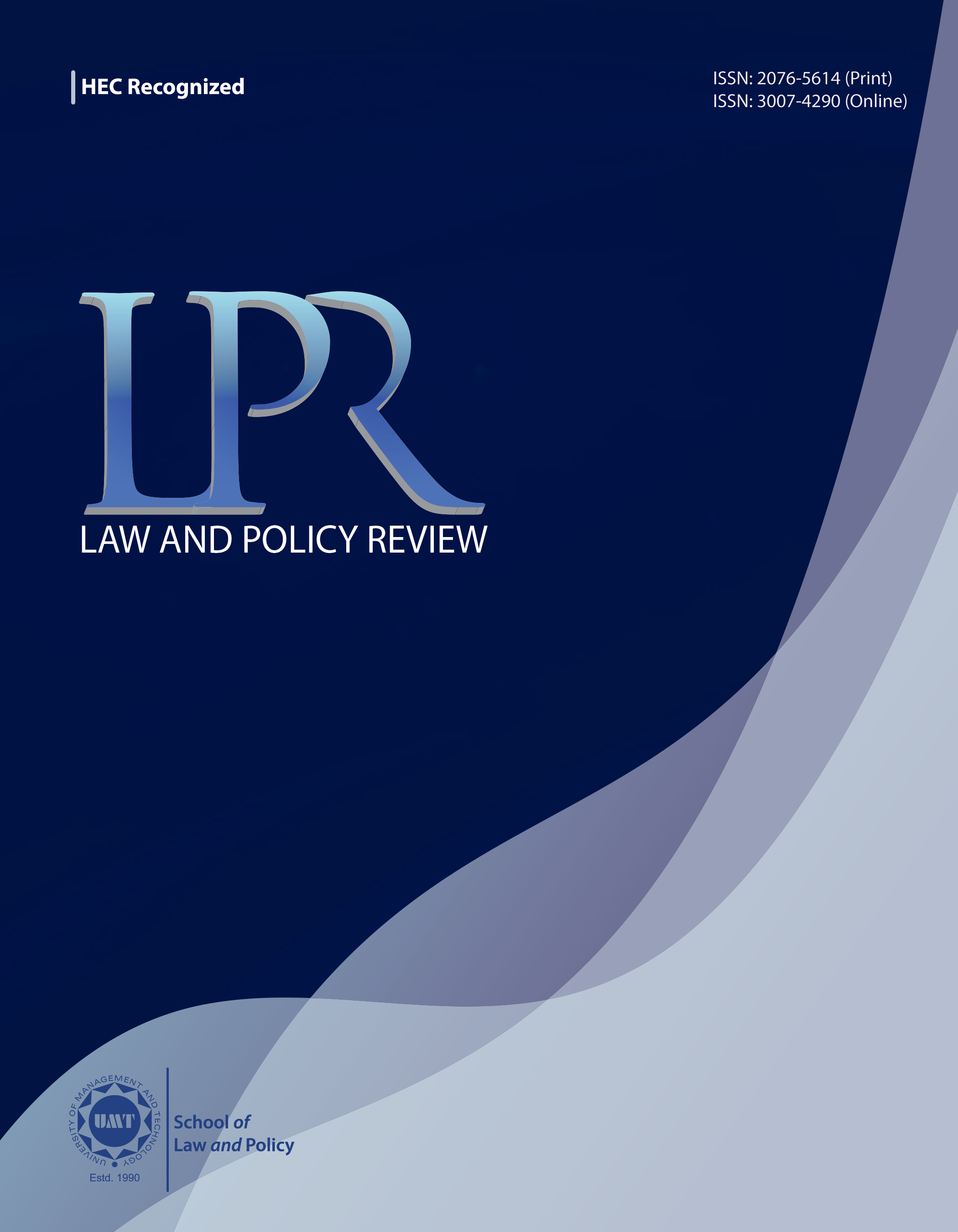Delegated Legislation in the Light of Taxation Laws: A Case Study of Pakistan
Abstract
 Abstract Views: 0
Abstract Views: 0
When legislative authority is granted to bodies other than the legislature, the legislation created by these bodies is referred to as delegated legislation (Singh, 2023). Legislation is the primary job of the people's representatives, called legislature. The need for delegated legislation in taxation laws arises due to evolving social norms and advancements in technology, such as the introduction of online filing of tax returns. These rapid changes have overburdened the legislatures and also exposed the lack of technical knowledge, prompting the transfer of legislative powers to the sub-ordinate departments of the government. This study employs an exploratory research methodology to investigate the concept and role of delegated legislation in the area of taxation laws in Pakistan. The area is explored based on the relevant laws, court decisions, and published articles. The role of delegated legislation in the context of taxation laws, misuse of authority, and discretionary powers exercised by the authorities is probed. The findings demonstrate that the provision for delegated legislation in the 1973 Constitution of the Islamic Republic of Pakistan was included with a specific purpose and is subject to certain restrictions. Under the taxation laws of Pakistan, the powers can be delegated to subordinates to achieve certain goals. The lawmakers establish the structure, and authorize the executives to make their own rules for smooth functioning, provided they remain within the boundaries defined by the legislature. Through delegation of powers, the function can only be performed by the officer of a certain rank. It is pertinent to mention that the authority to delegate powers can never be further delegated to any person.
Downloads
References
Allied Bank Limited v. The Commissioner of Income Tax, SCMR 1166 ___ (2023).
Chng, K. (2023). Re-examining judicial review of delegated legislation. Legal Studies, 44(1), 81–98. https://doi.org/10.1017/lst.2023
Craig, P. (1998). Ultra vires and the foundations of judicial review. The Cambridge Law Journal, 57(1), 63-90. https://doi.org/10.1017/S0008197300134397
Dandekar, D. (2023). Delegated legislation in Indian Forest Act, 1927. International Journal of Management & Human, 1(6), Article e1110.
Dhanjal, F. (2020, November 19). Administrative law: Delegated legislation part 1. https://farheendhanjal.law.blog/2020/11/19/delegated-legislation-part-1-administrative-law/
Freedman, J. O. (1976). Delegation of power and institutional competence. The University of Chicago Law Review, 43(2), 307-336. https://chicagounbound.uchicago.edu/uclrev/vol43/iss2/4
Federal Board of Revenue. (2007). Federal board of revenue act, 2007. https://download1.fbr.gov.pk/Docs/2011113111259609FBRActN.pdf
Haq Bahu Sugar Mills Pvt Limited v. Federation of Pakistan, PTD 629 ___ (2016).
Muhammad Aslam v. Director General Pakistan Coast Guards, PTD 629 ___ (2012).
Munir, M. (2021). Delegated legislation in Pakistan: Types, needs and its control by parliament and the courts. Social Sciences Research Network. https://dx.doi.org/10.2139/ssrn.3955761
Munira, S. A. (2022). The power of delegated legislation and its constitutional parameters: A critical analysis [Bachelor thesis, East West University]. EMU Institutional Repository.
http://103.133.167.11:8080/handle/123456789/3621
Pakistan Broadcasters Association v. Federation of Pakistan through Secretary of Information, Islamabad, CLC 871 ___ (2024).
Premier Industrial Chemical Manufacturing v. Commissioner Inland Revenue, PTD 398 ___ (2013).
Pywell, S., & West, T. (2023). Delegated legislation: What types are there, and how are they made? The Hansard Society for Parliamentary Democracy. https://oro.open.ac.uk/94691/
Rana, M. Z. R., Azam, A., Akbar, M. S., & Azeem, H. M. (2024). Delegated legislation in administrative law: An analysis of its expansion and forms. Pakistan Research Journal of Social Sciences, 3(3), 35–49.
Saragi, J. M., Ahlan, S. F., & Indrati, M. F. (2024). Implementing regulations for the omnibus law within the taxation cluster: A delegated legislation perspective. Jurnal Ilmu hukum Asosiasi Pimpinan Perguruan Tinggi Hukum Indonesia, 11(1), 20–44. https://doi.org/10.58829/lp.11.1.2024.20-44
Singh, R. D. (2023). Delegated legislation: A necessary evil. AGPE The Royal Gondwana Research Journal of History, Science, Economic, Political and Social Science, 8(4), 18–25.
Sjarif, F. A. (2023). Delegated legislation making models in Indonesia from 1999-2012. Pandecta Research Law Journal, 18(1), 133–149. https://doi.org/10.15294/pandecta.v18i1.44476
Zaver Petroleum Corporation Limited v. Federal Board of Revenue & Another, PTD 2332 ___ (2016).
Copyright (c) 2025 Ahtesham Dhariwal, Naveed Mushtaq Gondal, Muhammad Umar Zahid, Madeeha Arshad

This work is licensed under a Creative Commons Attribution 4.0 International License.
LPR follow an open-access publishing policy and full text of all published articles is available free, immediately upon publication of an issue. The journal’s contents are published and distributed under the terms of the Creative Commons Attribution 4.0 International (CC-BY 4.0) license. Thus, the work submitted to the journal implies that it is original, unpublished work of the authors (neither published previously nor accepted/under consideration for publication elsewhere). On acceptance of a manuscript for publication, a corresponding author on the behalf of all co-authors of the manuscript will sign and submit a completed the Copyright and Author Consent Form.





